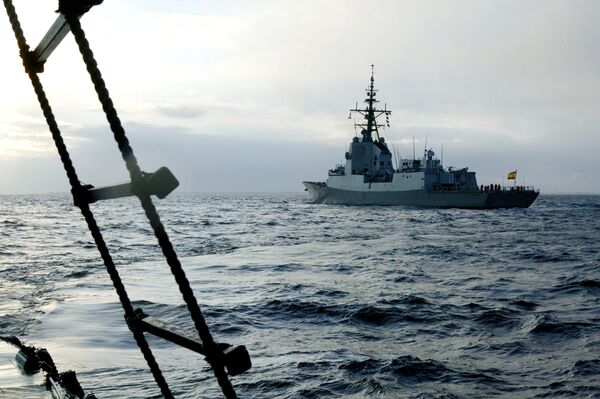BRUSSELS, April 16 (RIA Novosti) – NATO will intensify air patrols over Eastern Europe and dispatch extra ships to the Baltic and Mediterranean Seas due to the crisis in Ukraine, NATO Secretary General Anders Fogh Rasmussen said after a meeting of alliance ambassadors in Brussels.
“We will have more planes in the air, more ships on the water, and more readiness on the land,” Rasmussen said
“For example, air policing aircraft will fly more sorties over the Baltic region. Allied ships will deploy to the Baltic Sea, the Eastern Mediterranean and elsewhere, as required. Military staff from Allied nations will deploy to enhance our preparedness, training and exercises. Our defense plans will be reviewed and reinforced,” the NATO chief said.
“We will start to implement these measures straight away. More will follow, if needed, in the weeks and months to come,” he said.
Rasmussen added that NATO has no current plans to set up any permanent bases in Eastern Europe.
"We haven’t today taken decisions on such facilities. What we have done today is to agree on a package of measures that can be implemented immediately," he said.
“Our decisions today are about defense, deterrence and de-escalation. They are entirely in line with our international commitments,” the NATO Secretary General added.
Last week, the NATO chief voiced concerns about the situation in eastern Ukraine, stressing that Russia’s decision to intervene in the country will turn out to be a historic mistake that could lead to the country’s international isolation.
The Russian Foreign Ministry said the statements, as well as the alliance’s double standard on Crimea, have hindered a de-escalation of tensions in the country.
Tensions between Russia and the West became strained after a regime change in February when the Ukrainian parliament ousted President Viktor Yanukovych and scheduled early presidential elections for May 25.
Russia has described the uprising in Kiev as an illegitimate fascist coup and a military seizure of power that resulted in Moscow taking steps to protect ethnic Russians in Ukraine and reunify with Crimea following a referendum in the region.
The steps were heavily criticized by the US and EU, who imposed targeted sanctions against several Russian officials and suspended cooperation in certain areas.
On April 1, NATO ended all practical cooperation with Russia. The foreign ministers of NATO members are to review relations with Moscow at their next meeting in June.


